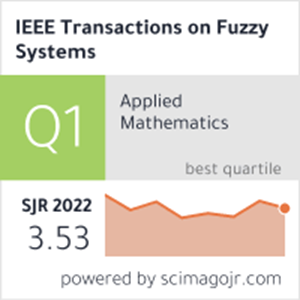Sensor and Actuator Fault Estimations and Self-Healing Control of Discrete-Time T-S Fuzzy Model With Double Observers and Its Application to Wastewater Treatment Process
IF 10.7
1区 计算机科学
Q1 COMPUTER SCIENCE, ARTIFICIAL INTELLIGENCE
引用次数: 0
Abstract
In real-world industrial control systems, the extended usage of diverse equipment and instruments over extended periods increases the likelihood of malfunctions in any process unit. Such malfunctions can significantly impact the entire system, leading to substantial economic losses. To address these challenges, this article proposes an actuator-sensor fault estimation and self-healing control scheme aimed at ensuring the stable and efficient operation of a discrete Takagi-Sugeno (T-S) fuzzy system. First, a dual observer fault estimation method is introduced to overcome the limitations of highly conservative stability conditions and limited applicability encountered when estimating actuator and sensor faults with a single observer. Second, self-healing controllers based on integral sliding mode and state feedback are individually designed. Lastly, leveraging the T-S fuzzy model of the wastewater treatment plant, simulation experiments are conducted to validate the efficacy of the proposed methods. Comparative analysis of simulation results reveals that the dual observer fault estimation methods exhibit faster response speed for both faults estimation. Furthermore, in comparison to other self-healing controllers, the fuzzy-weighted self-healing controller exhibits superior overall performance.带双观测器的离散时间 T-S 模糊模型的传感器和执行器故障估计与自愈控制及其在废水处理过程中的应用
在现实世界的工业控制系统中,各种设备和仪器的长期使用增加了任何工艺单元发生故障的可能性。这些故障可能会对整个系统造成重大影响,导致巨大的经济损失。为应对这些挑战,本文提出了一种执行器-传感器故障估计和自愈控制方案,旨在确保离散高木-菅野(T-S)模糊系统的稳定和高效运行。首先,引入了双观测器故障估计方法,以克服用单一观测器估计致动器和传感器故障时遇到的高度保守稳定性条件和有限适用性的限制。其次,单独设计了基于积分滑动模式和状态反馈的自愈控制器。最后,利用污水处理厂的 T-S 模糊模型进行仿真实验,以验证所提方法的有效性。对仿真结果的比较分析表明,双观测器故障估计方法对两种故障估计的响应速度都更快。此外,与其他自愈控制器相比,模糊加权自愈控制器表现出更优越的整体性能。
本文章由计算机程序翻译,如有差异,请以英文原文为准。
求助全文
约1分钟内获得全文
求助全文
来源期刊

IEEE Transactions on Fuzzy Systems
工程技术-工程:电子与电气
CiteScore
20.50
自引率
13.40%
发文量
517
审稿时长
3.0 months
期刊介绍:
The IEEE Transactions on Fuzzy Systems is a scholarly journal that focuses on the theory, design, and application of fuzzy systems. It aims to publish high-quality technical papers that contribute significant technical knowledge and exploratory developments in the field of fuzzy systems. The journal particularly emphasizes engineering systems and scientific applications. In addition to research articles, the Transactions also includes a letters section featuring current information, comments, and rebuttals related to published papers.
 求助内容:
求助内容: 应助结果提醒方式:
应助结果提醒方式:


